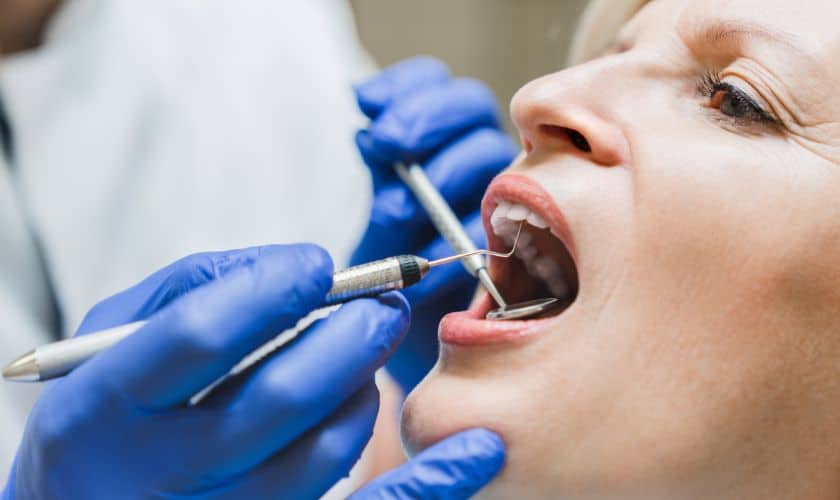Are you familiar with the saying, “An ounce of prevention is worth a pound of cure”? Well, when it comes to your oral health, this couldn’t be more true. Gum disease is a common yet often overlooked condition that can have serious implications for your overall well-being. From causing bad breath to leading to tooth loss, gum disease should not be taken lightly. In this blog post, we will explore the causes, symptoms, and most importantly, the preventive measures you can take to ensure better oral health. So grab a cup of tea or coffee and let’s dive into the world of gum disease!
What is Gum Disease?
Gum disease, also known as periodontal disease, is an infection of the tissues that surround and support your teeth. It typically starts with the buildup of plaque on your teeth. Plaque is a sticky film made up of bacteria that forms when you don’t brush and floss regularly.
As plaque accumulates, it hardens into tartar, which can only be removed by a dental professional. When tartar builds up along the gumline, it irritates and inflames the gums, leading to gingivitis – the earliest stage of gum disease.
If left untreated, gingivitis can progress to periodontitis. This is where things get serious. Periodontitis causes pockets to form between your gums and teeth, allowing more bacteria to accumulate. Over time, these pockets deepen, causing even more damage to the surrounding tissues and bone.
Without proper treatment or management, advanced periodontitis can result in tooth loss as the supporting structures become compromised.
Now that we understand what gum disease is, let’s explore its causes in more detail.
Causes of Gum Disease
Gum disease, also known as periodontal disease, is a common oral health issue that affects millions of people worldwide. While poor oral hygiene is often the main culprit behind gum disease, there are several other factors that can contribute to its development.
One major cause of gum disease is plaque buildup. When we don’t brush and floss regularly, harmful bacteria in our mouths form a sticky film called plaque on our teeth. Over time, if this plaque isn’t removed through proper oral care, it can harden into tartar and irritate the gums.
Another contributing factor to gum disease is smoking or tobacco use. Research has shown that smokers are more likely to develop gum disease compared to non-smokers. This is because smoking weakens the immune system’s ability to fight off infections and slows down the healing process.
Additionally, certain medical conditions can increase the risk of developing gum disease. Diabetes, for example, impairs blood flow and weakens the body’s ability to heal itself effectively. This makes individuals with diabetes more susceptible to infections such as gum disease.
Hormonal changes during pregnancy or menopause can also make women more prone to developing gingivitis (the early stage of gum disease). Fluctuations in hormone levels can lead to increased sensitivity in the gums and make them more susceptible to inflammation and infection.
Genetic factors play a role in determining an individual’s susceptibility to gum disease. Some people may be genetically predisposed to having weaker gums or an overactive immune response when faced with bacterial invasion.
It’s important to remember that while these factors contribute significantly towards developing gum diseases like periodontitis or gingivitis; maintaining good oral hygiene practices remains crucial for overall dental health.
Symptoms of Gum Disease
When it comes to gum disease, being aware of the symptoms is key in detecting and treating the condition early on. While some symptoms may be easy to overlook or dismiss as minor issues, they should never be ignored.
One common symptom of gum disease is persistent bad breath that doesn’t go away even with proper oral hygiene practices. Additionally, you may notice your gums becoming swollen, red, or tender. They might also bleed easily when brushing or flossing.
As gum disease progresses, you may experience increased tooth sensitivity to hot or cold temperatures. Your teeth may also start to feel loose or shift position due to weakened gums.
Another telling sign is frequent mouth sores and ulcers that take longer than usual to heal. If you notice any of these symptoms persisting for an extended period, it’s important to schedule a visit with your dentist for a thorough evaluation.
Remember, catching gum disease early can prevent further damage and help maintain good oral health. Stay vigilant and listen to what your body tells you!
Prevention of Gum Disease
Maintaining good oral hygiene is essential for preventing gum disease. Regular brushing and flossing are the cornerstones of a healthy dental routine. Brush your teeth at least twice a day, using a soft-bristled toothbrush and fluoride toothpaste. Don’t forget to clean along the gum line to remove any plaque buildup.
In addition to brushing, don’t underestimate the power of flossing! It helps remove food particles and plaque from between your teeth where your toothbrush can’t reach. Make sure you’re using proper technique and gently glide the floss in a C-shape around each tooth.
A balanced diet also plays a significant role in keeping your gums healthy. Limit sugary snacks and beverages as they can contribute to plaque formation. Instead, opt for nutritious foods like fruits, vegetables, lean proteins, and dairy products that provide essential vitamins and minerals for maintaining strong gums.
Regular dental check-ups are crucial for preventing gum disease too. Your dentist will be able to detect early signs of gingivitis or periodontal disease before they progress into more serious issues. Professional cleanings will help remove stubborn tartar build-up which can lead to gum inflammation if left untreated.
Avoid tobacco use in any form as it significantly increases your risk of developing gum disease among other oral health problems.
By following these preventive measures consistently, you’ll be well on your way to achieving better overall oral health!
Treatment for Gum Disease
When it comes to treating gum disease, there are several options available that can help restore your oral health. The specific treatment plan will depend on the severity of the condition and individual circumstances.
In cases of mild gum disease, known as gingivitis, a thorough professional cleaning by a dentist or dental hygienist may be sufficient to remove plaque and tartar buildup. They will also provide guidance on proper brushing and flossing techniques to maintain good oral hygiene at home.
For more advanced stages of gum disease, such as periodontitis, additional treatments may be necessary. These can include scaling and root planing, which involves deep cleaning below the gum line to remove bacteria and smooth out rough spots on tooth roots.
In some cases, antibiotics or antimicrobial mouth rinses may be prescribed to reduce infection-causing bacteria. In severe cases where the gums have receded significantly or there is bone loss around teeth, surgical intervention like flap surgery or bone grafts might be recommended.
Regular follow-up visits with your dentist are crucial for monitoring progress and ensuring any residual pockets of infection are fully treated. It’s important to remember that addressing gum disease promptly is essential in preventing further damage and protecting your overall oral health.
The Bottom Line
Maintaining good oral health is essential for overall well-being, and gum disease can have a significant impact on your oral health. By understanding the causes, symptoms, and prevention techniques of gum disease, you can take proactive steps to keep your gums healthy.
Remember that poor dental hygiene is often the main culprit behind gum disease. Therefore, it’s crucial to brush your teeth twice a day with fluoride toothpaste, floss daily to remove plaque from between the teeth, and visit your dentist regularly for professional cleanings.
Additionally, adopting a balanced diet rich in fruits and vegetables while limiting sugary snacks can also contribute to healthier gums. Avoiding tobacco products and managing stress levels are other lifestyle choices that can positively affect your oral health.

